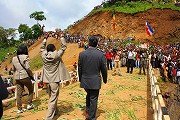|

|
|

|
| Ambassador's Speech>2011 >111118 | |||||
|
|||||
| At the Inauguration Ceremony for the Project to Construct the Sala River Bridge, South Omo Zone, SNNPRS on 18 November, 2011 |
 |
||||
|
Ato Molloka Ubnne, Chief Administrator of the South Omo Zone, Endemen Walachehu. Abbo. Lakkamiyon. I am most grateful to all of you for your very warm welcome today. The way from Gazer to Wubhamer is only 29 km but it was not as short as it sounds. This morning, it took about three hours for us to reach here. It was partly because of severe geographical conditions but also because we enjoyed a very warm welcome extended to us by hundreds of people in villages on the way. I am very pleased to come here all the way from Addis Ababa to see your smiles and happy faces today. This is my first trip to the South Omo Zone but my third trip to the Southern Nations, Nationalities and Peoples’ Regional State, a region of great diversity and dynamism. Now, it is a great pleasure for me to have this opportunity to attend the inauguration ceremony for the Sala River Bridge Construction Project in Wubhamer village. The project was funded by Japan’s grant-in-aid scheme for grassroots and human security projects, amounting to about USD 106,000, based upon the grant contract we signed last December. Our project partner is the Debub Ari Woreda, a local government. Since JFY1997, the South Omo Zone has been our partner for Grassroots Human Security Projects (GGP). To date, ten GGP projects have been implemented with total funding of USD 815,000 in this zone. Three of them are located in the Debub Ari Woreda, namely the Metser Primary School expansion project in JFY2005 and a food security project in JFY2007 which constructed a Famers’ Training Center and a nursery in Metser village and rehabilitated 15km of road from Shirshir village to Wubhamer village, and now this project that started in JFY2010. Ladies and Gentlemen, Improving access to social and economic services in rural areas is a great challenge in Ethiopia, and the Debub Ari Woreda is no exception. This woreda is located in one of the most remote areas of Ethiopia, and a shortage of food occurs from time to time. In the rainy season especially, people in Wubhamer village do not have easy access to the social and economic services across the river, such as the market and hospital, due to the frequent flooding that occurs. Similarly, each time the Sala River floods, people living in the surrounding villages cannot reach the market in Wubhamer village, where there is a famous enset market. In these circumstances, this project aimed at improving access throughout the year to social and economic services for the residents in this area by constructing a bridge over the Sala River, 11m in length and 3.7m in width with 10m bridge wings. As a result, 26,000 people living in this area will be able to cross the river safely throughout the year. This will bring significant economic and social benefits to the entire area since isolated villagers can now reach the principal markets and have better access to various public welfare services. There is one more point worth mentioning about this project. This is a community endeavor in which the residents participated by offering their labor and construction materials. It is also worth noting that the Debub Ari Woreda, especially Ato Ashenafi, the former Woreda Administrator, and Ato Daniel, the current Woreda Administrator, have facilitated this project with the Embassy to complete it on time in collaboration with the community and in line with the project guidelines. Ladies and Gentlemen, The newly built bridge is now handed over to the community and the Woreda. I am confident that you will make the most use of it and enjoy great benefits. At the same time, please keep in mind that it is equally important to maintain the bridge in good condition so that it will serve the local interests for a long time. Finally, I do hope that this Sala Bridge becomes a symbol of friendship and good will between the people of Ari and the people of Japan for many years to come. Also, I do hope that we can work together again for the economic and social benefit of underprivileged people in rural areas of Ethiopia. Amesagenalehu. Beri Imane. |
||||
|
|||||